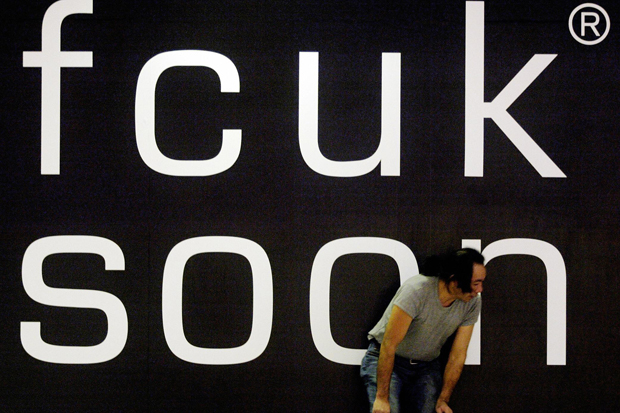When did the advertising industry decide that swearing sells? Look around you, and you’ll start to see rude, unfunny double entendres everywhere. The latest company to jump on the bandwagon is Toyota — currently flogging cars with the catchphrase, ‘Go Fun Yourself’. Try not to split your sides laughing.
I blame French Connection. In 1991, the once respectable clothes shop started referring to itself as fcuk. The company began knocking out T-shirts, saying nasty things like ‘Too busy to fcuk’ and ‘fcuk fashion’. The campaign was such a hit that, God help us, Conservative Future — formerly the Young Conservatives — called itself ‘cfuk’ for a while, until French Connection threatened legal action.
I’m all for double entendre. When handled brilliantly — fnaar! fnaar! — by Frankie Howerd or Viz’s ‘Finbarr Saunders and his Double Entendres’, it can be startlingly funny and original. Oh, for a swearing adman to match up to the double entendres of Kenneth Williams in Carry On Doctor:
Dr [Kenneth Williams]: ‘You may not realise it, but I was once a weak man.’
Matron [Hattie Jacques]: ‘Oh, don’t worry. Once a week’s enough for any man.’
The fcuk campaign was merely prurient and unfunny, because the structure of the joke was so banal. Turn two letters around and it sounds like a rude word; hardly comic genius. ‘Fcuk fashion’ isn’t much of a leap from ‘fuck fashion’ — and that isn’t an original, funny thing to say, either.
Still, the idea was so successful that desperate admen have copied it ever since. The principle remains unchanged — use a lame double entendre to barely conceal something rude, and the punters will rush to buy your stuff.
The upmarket Malmaison hotel chain has gone for the idea in spades. Staying in its Dundee outpost recently, I took advantage of the ‘Malmaison fig and olive body cleanser’. Using the fig ingredient as an inadequate peg, the tube declared it was ‘gettin’ jiggy wit’ da figgy’; ‘away from home, you want sexy foam, something to make them (ooh ooh ooh) moan and groan, squeeze the tube, that’s quite enuff, oh my lord, you look hot in the buff, now all clean, no longer dirty, isn’t it time for you to get flirty?’
Not funny — and not exciting: the only thing that got me going was the bad punctuation. Admen loathe commas, full stops and capital letters.
The same tired, offensive principle is at work on the side of an oyster van I recently saw outside the National Theatre. ‘Fancy a shuck?’ the sign said in twirly, retro, 1950s letters. I bet they were pleased with that — so much more shocking if you say rude things in an old-fashioned font.
I’m now operating my own, one-man, utterly pointless boycott of products promoted by horrible double entendre. I’m a bicycling obsessive but I refuse to use the popular bike-cleaning product ‘Muc-Off’. Presumably, they think that, by removing the ‘k’ from ‘muck’, it somehow makes the double entendre funnier. It doesn’t.
You can’t avoid the unfunny double entendre on telly, either. The holiday website booking.com has a voiceover on its advertisements saying ‘Look at the booking view.’ Mary Whitehouse, where are you now?
High fashion isn’t immune. Just before Christmas, the super-sophisticated fashionista Tom Ford launched a range of penis-shaped necklaces. Like a naughty schoolboy let loose on the catwalk, Ford designed the penis so that, from a distance, it looked like a crucifix — a jewellery double entendre, available in gold or silver. It was a brilliantly offensive trifecta: offensive to Christians; offensive to anyone who dislikes public obscenity; and offensively expensive, at $790.
At Christmas, Adam Mansbach brought out You Have to F**king Eat, the sequel to his parental advice book, Go the F**k to Sleep. Also on the seasonal shelves was Thug Kitchen: Eat Like You Give a F*ck, with useful advice like ‘This salsa lets people know you aren’t fucking around with your snack spread.’ We’ve reached peak fuck. Rude words have been thoroughly overexposed. As teachers used to say, ‘It’s not clever and it’s not funny.’
Got something to add? Join the discussion and comment below.
Get 10 issues for just $10
Subscribe to The Spectator Australia today for the next 10 magazine issues, plus full online access, for just $10.
Harry Mount is the author of How England Made the English (Viking).
You might disagree with half of it, but you’ll enjoy reading all of it. Try your first month for free, then just $2 a week for the remainder of your first year.














Comments
Don't miss out
Join the conversation with other Spectator Australia readers. Subscribe to leave a comment.
SUBSCRIBEAlready a subscriber? Log in